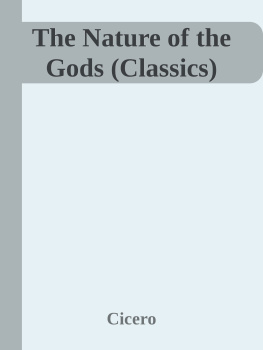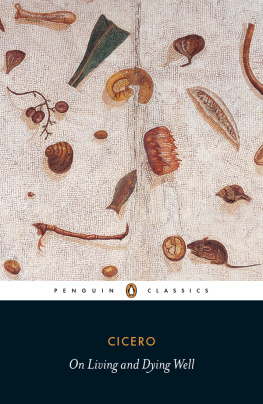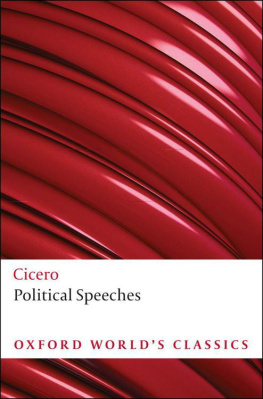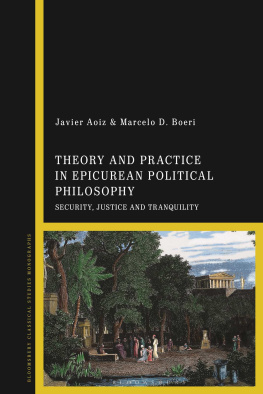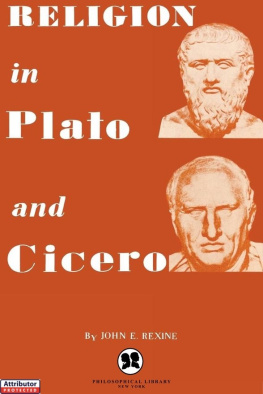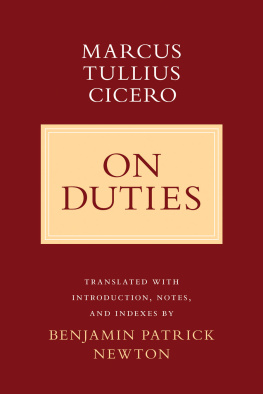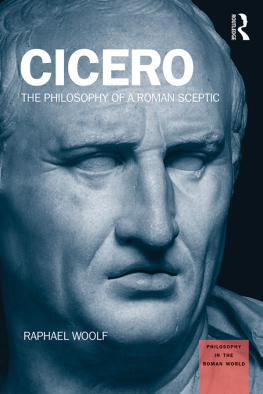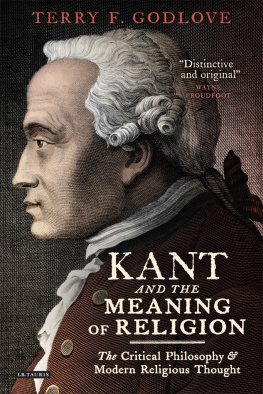
THE NATURE OF THE GODS
ADVISORY EDITOR : BETTY RADICE
M ARCUS T ULLIUS C ICERO (10643 BC ), Roman orator and statesman, was born at Arpinum of a wealthy local family. He was taken to Rome for his education with the idea of a public career and by 70 BC he had established himself as the leading barrister in Rome. In the meantime his political career was well under way and he was elected praetor for the year 66. His ambitious nature enabled him to obtain those honours which could normally only have been conferred upon members of the Roman aristocracy and he was duly elected consul for 63. One of the most permanent features of his political life was his attachment to Pompey. As a politician his greatest failing was his consistent refusal to compromise, as a statesman his ideals were more honourable and unselfish than those of his contemporaries. Cicero was the greatest of the Roman orators, possessing a wide range of techniques and an exceptional command of the Latin tongue. He followed the common practice of publishing his speeches. The information that they give us about contemporary social and political life is greatly increased by his letters, of which we have 900, published posthumously. His deeper thoughts are revealed by a considerable number of writings on moral and political philosophy, on religion and on the theory and practice of rhetoric.
H ORACE C. P. M C G REGOR was educated at Christs Hospital and Brasenose College, Oxford, where he graduated in classics and philosophy. After working as a private tutor, he entered the Home Office where he served until his retirement in 1967. He was always interested in the relationship between philosophy and religion and it was this interest which led him to translate The Nature of the Gods, a work which takes this problem as its central theme. He died in 1993.
J OHN M. R OSS , a civil service colleague of Mr McGregors, was educated at Highgate School and Wadham College, Oxford, where he graduated in classics and philosophy. In 1930 he entered the Home Office from which he retired in 1969.Throughout this time he kept up his interest in classical studies and also became interested in Christian theology.
CICERO

THE NATURE OF THE GODS
Translated by HoraceC. P. McGregor
with an introduction by
J. M. Ross
PENGUIN BOOKS
PENGUIN BOOKS
Published by the Penguin Group
Penguin Books Ltd, 80 Strand, London WC2R 0RL, England
Penguin Putnam Inc., 375 Hudson Street, New York, New York 10014, USA
Penguin Books Australia Ltd, 250 Camberwell Road, Camberwell, Victoria 3124, Australia
Penguin Books Canada Ltd, 10 Alcorn Avenue, Toronto, Ontario, Canada M4V 3B2
Penguin Books India (P) Ltd, 11 Community Centre, Panchsheel Park, New Delhi 110 017, India
Penguin Books (NZ) Ltd, Cnr Rosedale and Airborne Roads, Albany, Auckland, New Zealand
Penguin Books (South Africa) (Pty) Ltd, 24 Sturdee Avenue, Rosebank, 2196, South Africa
Penguin Books Ltd, Registered Offices: 80 Strand, London WC2R 0RL, England
www.penguin.com
This translation first published 1972
Translation copyright Penguin Books, 1972
Introduction copyright J. M. Ross, 1972
All rights reserved
Except in the United States of America, this book is sold subject to the condition that it shall not, by way of trade or otherwise, be lent, re-sold, hired out, or otherwise circulated without the publishers prior consent in any form of binding or cover other than that in which it is published and without a similar condition including this condition being imposed on the subsequent purchaser
ISBN: 978-0-14-195929-0
CONTENTS
INTRODUCTION
by J. M. Ross
The Nature of the Gods is a puzzling yet fascinating work. Anyone coming to it fresh from our modern world is likely to find it a strange mixture of sense and nonsense, wisdom and puerility, acute reasoning and palpable fallacies. But it will never yield its fruits to us if we read it as a timeless distillation of perennial philosophy: it takes its character from the personality of its remarkable author, from the particular point in his life at which it was written and from the particular stage to which Greek thought had developed in the middle of the first century B . C . To help the reader to get the most out of this treasury of ancient argumentation, this Introduction deals with the following four topics:
(1) who Cicero was and why he wrote this book;
(2) The Nature of the Gods itself;
(3) the rival philosophies expounded in it; and
(4) its value in subsequent ages and at the present day.
Much has already been written on them, and material for further study will be found in the bibliography at the end of this book.
1
CICERO
Cicero has gone down to fame as an orator skilled in the art of invective; a well-meaning but not very successful politician; the author of some execrable verse; and the writer of some rather attractive, self-revealing letters. One does not expect such a man to have anything of value to contribute in the fields of philosophy and theology. But the truth about Cicero is rather different, as a brief survey of his life will show.
Marcus Tullius Cicero was born in 106 B . C . at Arpinum, sixty miles south-east of Rome, on his well-to-do fathers country estate. His father was a studious semi-invalid who took great pains over the education of his two sons, Marcus and Quintus, and took a house in Rome in order to fit them for a public career. To qualify for public office in Rome it was essential to be trained in the law, and in his later teens Cicero became a pupil of Scaevola, one of the greatest constitutional lawyers of the day. In addition to law Cicero studied rhetoric (the art not only of public speaking but of presentation of an argument) and philosophy. In philosophy he had the good fortune to study, in his formative years, under gifted exponents of each of the three main contemporary schools of thought. First he studied Epicureanism under Phaedrus, and gave his assent to his teaching, influenced no doubt by the sweetness and charm of his character. In 88, however, Cicero found a new master. Philo, the leading exponent of the philosophy known as the Academy, arrived in Rome as a political refugee from Athens; Cicero lost no time in taking instruction from so distinguished a teacher, and was immediately converted to his school of thought. Never again did Cicero show anything but hostility to Epicureanism. (In this he may have been influenced by the fact that Epicurus advised his followers to withdraw from the turmoil of public affairs, whereas during the greater part of his life Cicero was ambitious to play a leading part in politics.) So enamoured was Cicero of Philos teaching that for a time he resolved to devote himself entirely to philosophy, imagining that the civil war between Marius and Sulla had permanently extinguished the The teaching of Philo was decisive for Ciceros subsequent life, and its principles inspired and held together all his varied activities to the end of his days. In contrast to the dogmatic claims of Epicureans and Stoics to absolute truth, the Academy proceeded by sceptical examination of all positions in order to find which was most probable, and this was always Ciceros method, so that just as he opposed all absolutism in philosophy, so also he opposed all absolutism, real or threatened, in government, whether the threat came from Sulla, Catiline, Caesar or Antonius.

